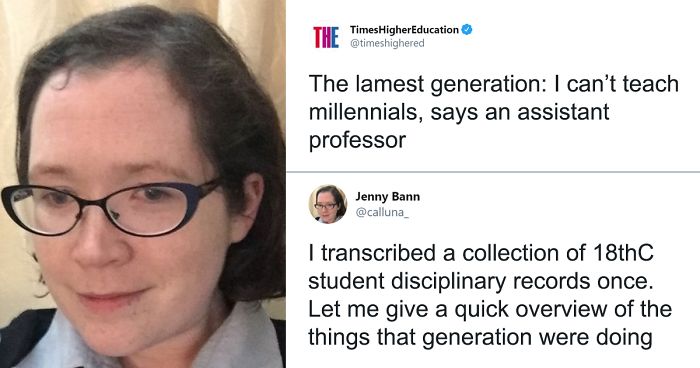
Woman Shares 18th Century Student Disciplinary Records In Response To ‘Millennials Are The Worst’ Claim
Interview With ExpertEach and every generation thinks that the one that comes after it does things wrong. It’s just a fact of life that grown-ups can’t abide by how youngsters live their lives because they feel completely alien and out of sync with the way the world ‘should’ be.
If you’re one of the many, many people who think that millennials are part of the ‘worst’ generation ever, then it’s a good idea to read through Jenny Bann’s thread on Twitter for some perspective. Bann, who goes by the moniker calluna_ on Twitter, describes the raucous revelry and devilish dares that 18th century students were known for. From sword fighting to quaffing copious amounts of ale in taverns, these youths were known for being chaotic, loud and free. Which shows that what we have to deal with today might not be all that bad and that there was never a ‘golden age’ where everybody behaved properly. A real shame that sword fighting lost its popularity, though. Scroll down to read Bored Panda’s in-depth interviews about millennials with Bann, Professor Eddy Ng from Bucknell University, Professor Richard Landes from Boston University, and Dr. Sean Lyons from the University of Guelph.
More info: Twitter
It’s no surprise that lots of people don’t like millennials. However…
Image credits: timeshighered
…Jenny Bann proved that 18th century students were way rowdier than millennials
Image credits: calluna_
Image credits: calluna_
Image credits: calluna_
Image credits: calluna_
Image credits: calluna_
Image credits: calluna_
Image credits: calluna_
Image credits: calluna_
Image credits: calluna_
Image credits: calluna_
Image credits: calluna_
Image credits: calluna_
Image credits: calluna_
Image credits: calluna_
Image credits: gumnut49
Image credits: calluna_
Bann, an academic who now works at the Scottish government, chronicled the lengths to which youngsters from the past went to create chaos. She did this in response to a tweet by Times Higher Education about how millennials refuse to take responsibility for learning.
Bored Panda contacted Bann to learn more about 18th century students and her thoughts about millennials, as well as about the opinions different generations have about one another.
When asked why so many people nowadays can’t stand millennials, Bann said: “Oh, someone could write a book on that! My best guess: complaining about ‘millennials’ is a way to grumble about ‘young people today’ while kidding yourself that you’re talking about the faults of a specific generation. The oldest millennials were born in the early 1980s, they’re in their late 30s now, but people are still talking about ‘millennials’ and meaning teenagers and not people with children and mortgages and senior jobs.”
The unruly students Bann was talking about were from Glasgow, Scotland
Image credits: rhiannonrevolts
Image credits: calluna_
Image credits: Rob_Rainbolt
Bann revealed that punishments for unruly students in the 18th century varied, ranging from fines to expulsion. “Quite often they were fines (many of the disciplinary records we have are because some external party petitioned the university for compensation after damage to property, so the fines covered the damage). Sometimes students were expelled from the university.”
“One group of students set up a petition to formally complain to the university about a professor who hit a young student with a candlestick. They could have got in trouble for that themselves, but they obviously felt that the student who’d been hit had been very badly treated and they needed to stand up for him. I admire that,” Bann shared the most impressive thing that she had read about 18th century students doing in Glasgow, Scotland.
Students nowadays seem like saints, compared to students from the past
Image credits: ElizabethCatlos
Image credits: sallydemarest
Image credits: MarkCC
Image credits: edujdw
Image credits: TracieHunte
According to Bann, “we all have a tendency to be nostalgic about our own generation” and every generation eventually learns to criticize newer ones. “But it’s also a way to make big societal changes less scary. So you get a lot of people complaining that young people today don’t take work seriously because they expect to move round employers. But there’s no such thing as a job for life anymore for most people — why should they act as though there is?”
“In the original discussion about this I heard lots of people calling millennials ‘entitled’, and that strikes me as a strange insult to use. Look at these 18th century students — they came from a generation that thought they were entitled to take over large portions of India with the East India Company, that thought they were entitled to own slave plantations in the Caribbean. Surely that’s more ‘entitled’ than any annoying student today!”
We all like to think that we know how to have a good time. But 18th century students take the cake. They fought. They drank. They danced with girls they were told not to dance with. They made offensive toasts. They wrecked homes, broke furniture, and skipped lessons. They insulted the university and the armed forces. They scared servants and beat innocent passers-by. While we can’t condone this sort of behavior, two things are crystal clear: people from the 18th century sure knew how to party; and very few millennials are as bad as these guys.
People really have whined about young generations for a long time. BBC Worklife reveals how this has been going for more than 2,000 years, since before Jesus Christ was born. Aristotle, who lived in the 4th century BC, lamented that the young people of his day thought they knew absolutely everything about life. While Horace, living in the 1st century BC, was angry that youngsters spend too much money on useless things.
Does all of this sound familiar? People were having these thoughts an incredibly long time ago, and it doesn’t seem like things are bound to change in the near future. Why do you think older generations have so much criticism for younger generations? Would you like to see a return of sword fighting? Let us know in the comments!
People thought Bann’s tweets were very much worth reading
Eddy Ng, the James and Elizabeth Freeman Professor of Management from Bucknell University, explained to Bored Panda more about millennials. “Millennials have been defined by demographers in North America as those born on or after 1980/1981. Generally, they have been socialized during the turn of the century with technology influencing everything they do. Because they have been raised in a relatively middle-class environment, they tend to be over parented (the terms “helicopter parents” and “lawnmower parents” were coined to describe the parents of millennials). As a result, millennials have higher self-esteem compared to previous generations (cross-temporal meta-analysis conducted by Jean Twenge). They tend to portray themselves as assertive, ambitious and achievement-oriented (our own study). The general public and media have also referred to Gen Z (those born on or after 1995) as millennials. We should bear in mind that the oldest millennials are now about 40 years old (from the Gen Y cohort).”
“Because millennials were raised in very different environments (middle class, over parenting which is a part of the self-esteem movement), they do not conform to the more traditional approaches of doing things. For example, there is less respect for hierarchy and “doing time” as technology has changed the way we work,” Professor Ng said. “This inevitably creates a faultline in the workplace between older and younger generations of workers. Older workers (e.g., boomers) are rule-bound (they created the rules!), millennials ignore them and rewrite these rules. For example. older workers strictly observe the 9 to 5 workday, millennials would stream into the workplace at 10 but work during their “waking hours.” Previous generations find these behaviors to be irritating.”
“Every generation is focused on themselves — even boomers and Gen Xers. It’s really interesting hearing Gen Ys (older millennials) complaining about Gen Zs (younger millennials). “Kids these days…” Part of this can be explained by the anxiety or fear of being displaced. Boomers considered themselves as “the greatest generation” (Tom Brokaw). This (irrational) fear is most acute when technology changed how we live and work. Millennials, having been born and raised in a digital era, are much more adept and versatile in incorporating technology in everything they do. The boomers find it more difficulty transitioning from their pre-technology ways. They still wear an old fashioned analog wristwatch (to tell time) and don’t understand why millennials need to be plugged in through their smartwatches,” the professor added.
Meanwhile, Professor Richard Landes, who teaches history at Boston University, presented a much more critical opinion about millennials and suggested that the most outstanding characteristics of millennials would be their “sense of entitlement” and the “lack of self-critical apparatus.” “The difference between millennials and previous generations is not the presence of this mentality among members, but their prominence.”
When asked why some people might not be able to stand millennials, Professor Landes replied: “Who wants to deal with a self-absorbed, entitled, moralizers, no matter how brilliant?” The professor also raised the question of whether any generation had ever learned to criticize itself.
Professor Landes also had some advice for millennials. “Not every monster in the closet of your imagination is a teddy bear waiting to be hugged by you. You may, especially as entitled progressives, have real enemies, and they’re not necessarily the ones who criticize you substantively. You are the first generation to grow up alongside this world-changing technology of the internet. Learn to master it, not have it master you. And to those millennials (i.e. born 1981-2000), who are tempted by millennialism (i.e. the belief that one can help bring heaven on earth, that is, a perfect society, now): when you think you’re woke and your revolutionary leaders are aggressive hypocrites, you’re in trouble.”
Dr. Sean Lyons from the University of Guelph explained to Bored Panda that “it’s difficult to characterize an entire generational cohort succinctly, as there is a lot of variation within the group.”
“It’s easiest to note the socio-historical factors from their formative years that are unique. These include saturation of Internet media and other information technology and the prevalence of social media. Relative to previous generations, millennials are more likely to be comfortable with the ubiquity of social media and always being visible to their peers in the online world. In many countries, millennial-aged people faced austerity and poor labor market conditions relative to their parents’ generation. Despite greater educational opportunities, it has been difficult for many millennials to get established and own homes, even when they have education and training.”
“The most common stereotypes about millennials is that they are entitled and self-centered. There’s likely an element of truth to these claims, as there are overall trends toward increased individualism in Western societies, and young people likely feel that they should see the benefits of their relatively high levels of education,” Dr. Lyons argued. “At the heart of these inter-generational conflicts are identity issues. Older generations are prone to comparing younger people to themselves at the same age. Millennials are also making comparisons, but might feel that they should be doing better than previous generations because they are better educated as a whole. Essentially it’s an issue of perspective.”
“When a new generation is first observed and identified, there is a mixture of hope and worry among older generations. Millennials were originally depicted as the ‘next great generation.’ Eventually, as the members of the young generation grow up, they fail to live up to the heightened expectations of older generations and they are criticized for being disappointing. Typically younger generations are criticized as being relatively lazy and lacking work ethic, but each generation faces unique criticisms. For millennials, the criticism was that they are entitled and narcissistic and whiny. The post-millennial generation is now being criticized for being overly sensitive and lacking resilience. They’re called ‘snowflakes.’ They’re also criticized for having poor social skills, ostensibly because they’re ‘addicted to social media.’ The generation that follows them will be criticized for something else. This pattern seems to be fairly universal, and it is rooted in each generation’s place in history and their fears and hopes for their successors.”
“The way that Millennials are normally defined, as people born between 1980 and 1994, places them at ages 25-39 right now. It’s important to remember that this is not the generation that’s currently in high school or college. These are young adults,” Dr. Lyons explained. “One notable trend in the Western world is that people in this age group are growing up more slowly than in the past. Relative to previous generations, they are taking longer to finish education, move out of parents’ homes, get started in their careers, start long-term relationships, have children and own homes. They are acting just like people in previous generations in many ways, but on a delayed schedule. That will have consequences for their entire life course.”
“Another important thing to remember is that millennials are not one homogeneous group. The people born in that era have very diverse experiences based on their socio-economic status, gender, race, nationality, religion, sexual identity and other factors. Being millennial-aged is only one aspect of a person and in most situations, it’s not the most important.”
To say any specific generation is worse than the other is stupid. People just want to feel superior to others.
Yeah, and I’m getting more than a little tired of the demonization of a whole class of people. Actually both peoples. People keep forgetting that there are PoC Boomers, (and they aren’t saying these things about what are actually “grownups”.)
Load More Replies...It is always the latest generation that people think is the worst. I know mine (early Gen-X) was considered lazy and ill-prepared by the boomers and their parents.
Im lost at the obscene toast and Im not sure I would like to know what was about...
I'm sure it's along the lines of the " There once was a man from Nantucket..." Jokes. I wish we had some examples. I'm sure they'd be funny.
Load More Replies...To say any specific generation is worse than the other is stupid. People just want to feel superior to others.
Yeah, and I’m getting more than a little tired of the demonization of a whole class of people. Actually both peoples. People keep forgetting that there are PoC Boomers, (and they aren’t saying these things about what are actually “grownups”.)
Load More Replies...It is always the latest generation that people think is the worst. I know mine (early Gen-X) was considered lazy and ill-prepared by the boomers and their parents.
Im lost at the obscene toast and Im not sure I would like to know what was about...
I'm sure it's along the lines of the " There once was a man from Nantucket..." Jokes. I wish we had some examples. I'm sure they'd be funny.
Load More Replies...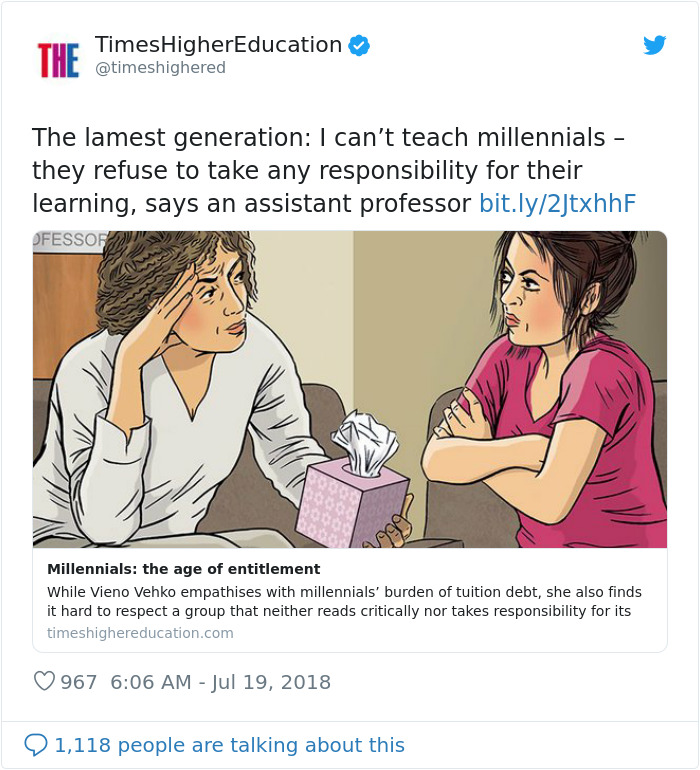
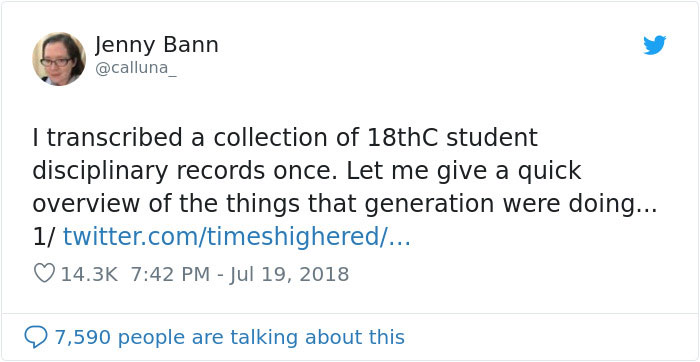
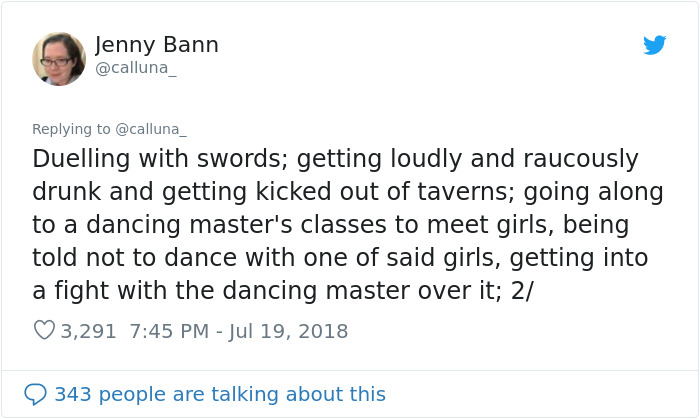
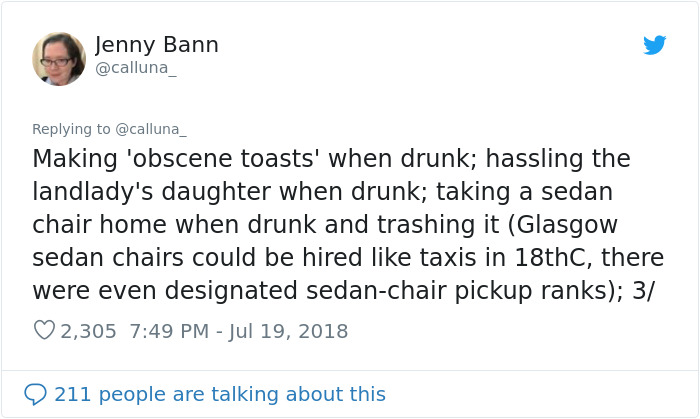

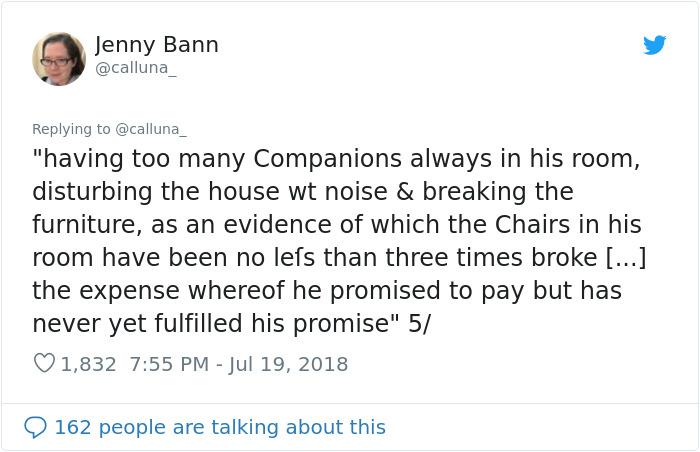
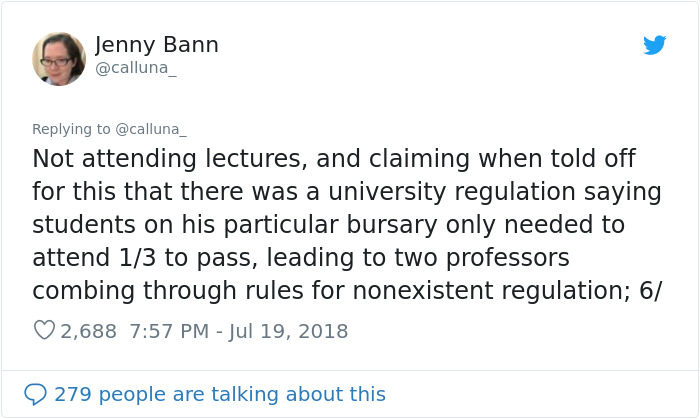
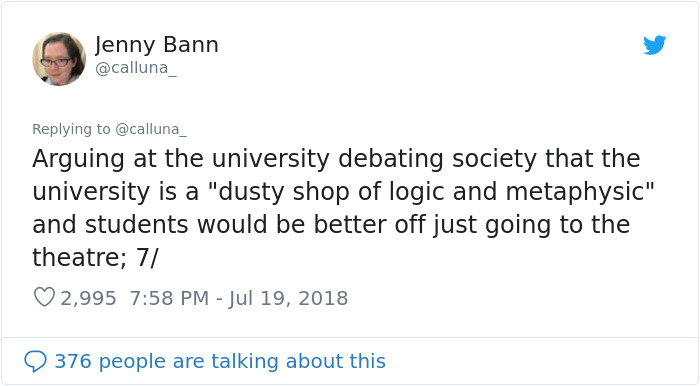


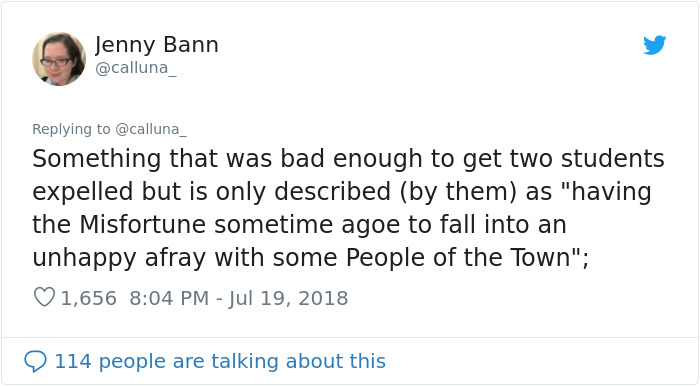
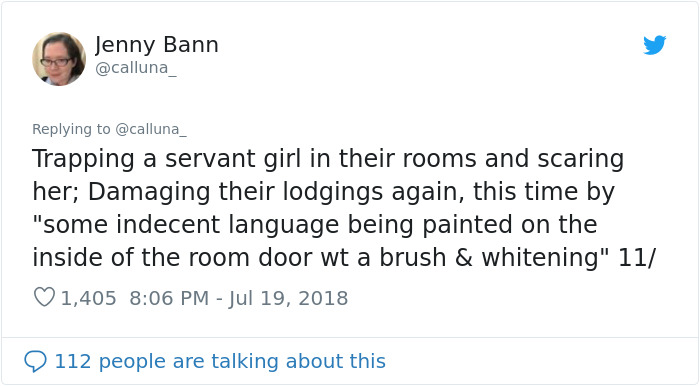



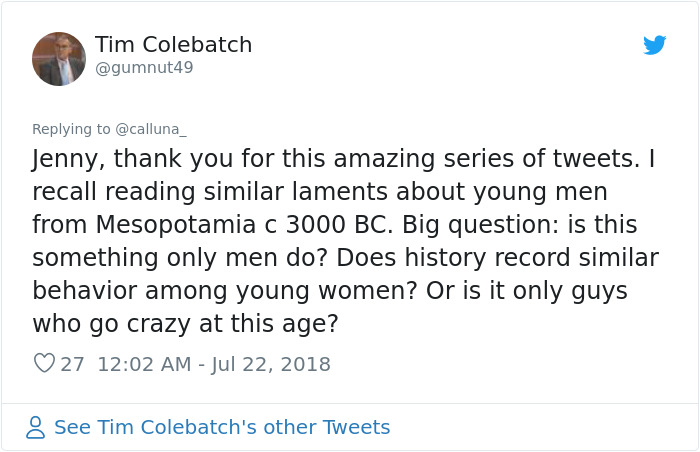
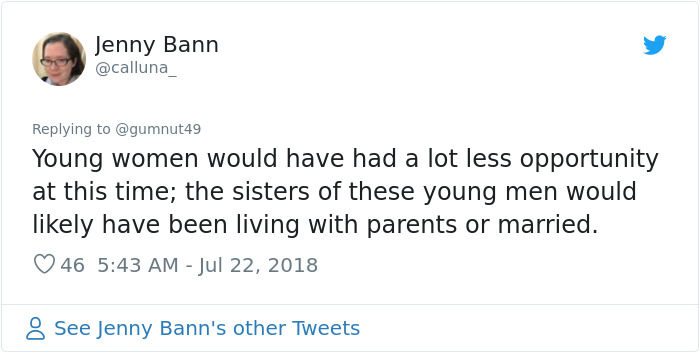


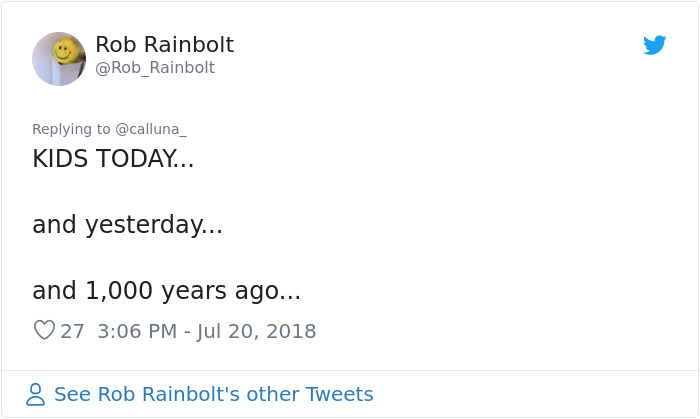



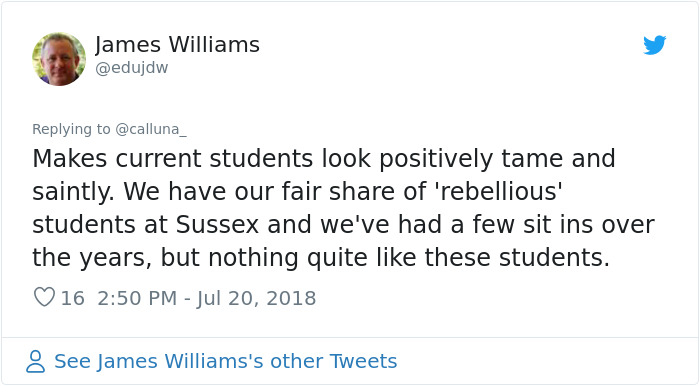
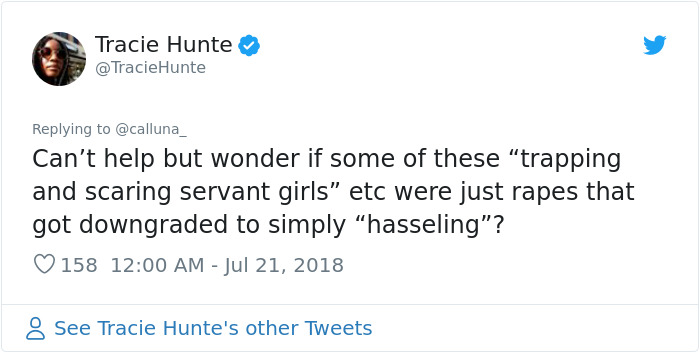










135
41